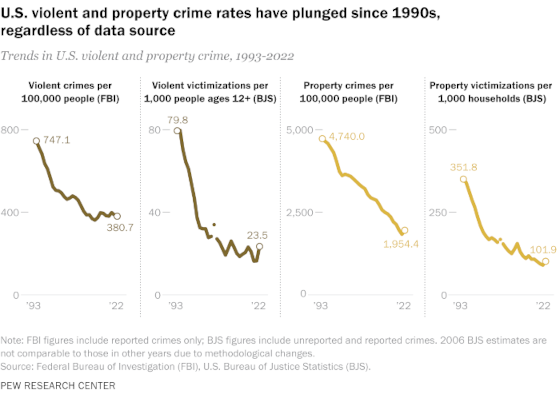Deterministically, you're probably just lucky you're not a criminal
Some good news
Unrelated, some really important good news before I start this, that I didn't know before researching a bit for this article

U.S. violent and property crime rates have plunged since 1990s, regardless of data source (source : pew research )
What is Determinism?
For those not familiar with philosophy (if you are, maybe skip this section), determinism is the idea that every event is determined by previous events, and that there is no "free will", in the sense of a concept to where you can make "completely free choices"
So maybe if you chose to have a blue ice-cream today morning, that event might have been influenced by you seeing a blue haired person yesterday morning, and somehow, even if unconciously, finding yourself having been attracted to that – so you got a blue ice cream now
This topic is debated strongly amongst philosphers
Another thing – again, if you're new to philosophy, you should keep in mind is that you still have "control" over your actions to a degree, i.e. this still means, if you go to therapy, take appropriate medications, you will still improve
Determinism doesn't mean you can't change your actions and should not be used as an excuse for so
But rather that you couldn't have changed your prior actions, and you would have always made that choice, given the knowledge you had at that time
Either way though, it does put the reason to why I believe in reformative justice very very strongly
Some Statistics
Statistically speaking, the overwhelming amount of people arrested are poorer than the median population[1] [2]
So I make 2 arguments here
The philosophical argument
At it's core, even for individuals that are extremely priviledged, say a very rich person getting incarcerated – who hasn't self reflected, they have likely been influenced via their peers, possibly having narcessistic or abusive parents, or perhaps some sort of mental disease
Determinism would argue that they had no choice but to do otherwise, and to not have done the harm they did, and that in the exact same circumstances – you likely would have been influenced via the exact same factors and commited the exact same form of harm, even if you believe differently, since you would have been similarly influenced in those circumstances, and come to similar conclusions to taking the same actions they made
We still should seperate people that are commiting harm towards society, but recognition of determinism (if you believe so), only leads to the conclusion that if we work on changing people's circumstances, perhaps helping people psycologically – even if the same things were to happen to us, i.e. we are influenced via the same factors – we can feel lucky that we're in a society that seeks to help us heal, improve us – rather than punishing us or looking at us as irrepairable individuals
The statistical argument
Statistically speaking, the overwhelming amount of people arrested are poorer than the median population[1] [2], they're extremely disproporitionately from black or hispanic backgrounds (in the USA)[3]
And this means that realistically, most arrested people have all been coming from the same circumstances, and to incarcerate so many people – that seem to have simlarly suffered in their upbringings, likely means that our mechanism of punishing individuals, rather than helping them, is not a fair one
References
[1]: Prison Policy Initiative. "Prisons of Poverty: Uncovering the pre-incarceration incomes of the imprisoned". https://www.prisonpolicy.org/reports/income.html
[2]: Brookings. "Work and opportunity before and after incarceration". https://www.brookings.edu/wp-content/uploads/2018/03/es20180314looneyincarceration_final.pdf
xoxo - appreciate you